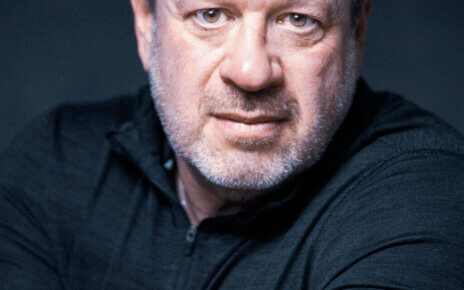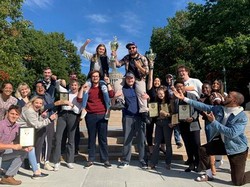A Monmouth University Research lab has received a substantial grant award to fund further projects.
Dr. Dmytro Kosenkov, Assistant Professor of Chemistry, and his research group have received the $100,000 Cottrell Scholar Award.
The Cottrell Scholar (CS) program is funded by the Research Corporation for Science Advancement (RCSA). Founded in 1912, RCSA is the second-oldest foundation in the United States and the oldest for science advancement.
According to the RCSA official website, the corporation is a foremost proponent of the academic sciences and scientific innovation and is a prominent financial provider for research projects in American colleges and universities.
As the website states, “The Cottrell Scholar program develops outstanding teacher-scholars who are recognized by their scientific communities for the quality and innovation of their research programs and their academic leadership skills.”
$100,000 is a substantial grant award and will allow Kosenkov and his group to further develop their research. Universities often are unable to fund the entirety of a research project alone, so they reach out to corporations that are willing to invest in the projects and provide funding for their completion.
Having completed his postdoctoral training at Purdue University, Kosenkov began teaching at MU in 2012. He received his PhD in chemistry from Jackson State University, after earning his master’s and bachelor of science degrees from the prestigious Taras Schevchenko National University of Kyiv, Ukraine.
The group has received funding for the project entitled “Exciton Energy Transfer in Light Harvesting Proteins with Covalently Bound Pigments: The Role of Molecular Vibrations.”
“The project aims to advance the development of organic photovoltaic devices by mimicking natural light harvesting complexes (LHCs),” said Kosenkov. “The project also includes an education component focused on proving high-quality hands-on experiences for Monmouth University students.”
Chemistry is a complex, fascinating, and often confusing field of science, and this grant award will allow Kosenkov and his group to make great advancements in their research and uncover great scientific phenomena. Kosenkov’s group applies computational quantum chemistry in order to understand the fundamental laws that govern chemistry in living organisms. .
The group’s prediction is that molecular vibrations amplify the energy transfer through quantum coherence effects. Specifically, the vibrations of light-absorbing pigments, due to their strong bonding to the rest of the light harvesting complexes, assist synchronous transfer of solar energy occurring in the LHCs.
Additionally, numerous undergraduate students are actively involved in the project by running computer simulations, analyzing results, presenting at research conferences, and co-authoring research papers. Michael DeFillipo, a psychology major and chemistry minor, Brittany Reed, a chemistry major and Information Technology minor, and Danielle Valdez, a chemistry student, are the primary research assistants on this comprehensive project.
“As with any research in any field, the acquisition of grant money is crucial to provide for resources to continue the research. Specifically for our research group, the grant money will be used towards upgrading our research laboratory and equipment (like the computers, software, and servers),” said DeFillipo. “The specific research we are performing requires high-powered computers and servers to carry out a lot of quantum mechanics and quantum chemistry equations, as well as for creating protein models and simulated environments that are crucial to understanding the physics, mathematics, and chemistry behind chemical processes.”
For MU, such a grant is significant, as it will bring attention to the university and further cement the school as a reputable force in the field of science. Since MU is a small, private, independent university, students have more opportunities to work directly with professors. At a larger school, students are often overlooked and are unable to participate in significant, one on one research projects with professors. However, at MU, many students are given the opportunity to participate in projects that can potentially lead to stunning scientific discoveries.
“We break our focus down into long-term and short-term goals. Our long-term and overall goal is to improve efficiency of solar cell technologies by studying biological organisms. We do that all via computer by examining, modeling, and making calculations about the proteins that carry out the energy-harvesting processes of photosynthesis very well, and examining what it is about their structure and means of transferring energy that makes them so efficient,” said DeFillipo. “In the short term, we are currently comparing different biological light-harvesting protein complexes. The idea is that by comparing them against each other and their evolutionary ancestors, we can see what sort of structural, chemical, and quantum benefits there are to different types of biological light-harvesting complexes.”
The team uses specific computational methods derived from quantum and molecular mechanics to obtain descriptions of the key mechanisms of energy transfer in phycoerythrin and related light harvesting complexes. If the project succeeds, new efficient photovoltaics capable of vibrationally assisted energy transfer will be created.
Kosenkov teaches general, physical, and computational chemistry courses and is well-received among students and faculty alike. The Cottrell Scholar Award also has an educational component in which Kosenkov plans on revising many of the school’s physical chemistry laboratory courses by implementing original research projects into the class. With this, students will develop important critical thinking, problem solving skills, and a deeper understanding of the overall course content.
“Receiving the Cottrell Scholar Award is significantly important to the future of our research. This $100,000 grant will be used to improve our computing facilities as well as our physical chemistry laboratory. Our current research focuses heavily on the use of computational techniques, which are contingent upon an up to date and advanced computing facility,” said Reed. A more advanced computing facility will in turn prove extremely beneficial to our group in terms of conducting our research in a more timely fashion and with greater accuracy. This grant will also prove beneficial to other members in our research group with respect to their own research projects that rely on experimental techniques as well as computational techniques. An improved physical chemistry laboratory will assist in performing research experiments in a more organized laboratory environment, with new technology needed to perform any given research experiment.”
Thus, the Cottrell Scholar Award of $100,000 is substantial and will allow Kosenkov and his research team to make significant developments in their project.



